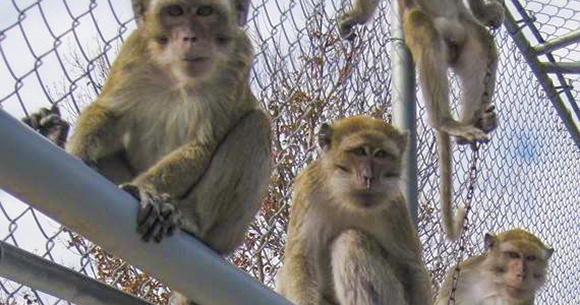Social Housing Status of Primates in Labs: Effects on Compassion Fatigue
by Lace E. Logan, Dr. Lara K. Ault, and Dr. Keith W. Burton
This study, which was funded by a Refinement Grant from AWI, examined the impact of nonhuman primate social housing status on compassion fatigue in laboratory animal care professionals, who are at an elevated risk of experiencing this condition. Compassion fatigue is a consequence of stress that results from caring for suffering individuals, leading to a gradual erosion of empathy and compassion.

The study explored how animal care professionals’ understanding of nonhuman primate social housing may influence compassion fatigue. The extent of participants’ understanding of social housing was assessed via a series of questions probing their knowledge of the impacts of social housing on the welfare of nonhuman primates; for example, whether social housing “is necessary for psychological health,” “harmful,” “increases chronic stress,” or “decreases chronic stress.” Forty-five National Primate Research Center employees were surveyed.
The hypothesis that animal care professionals working mostly with single-housed nonhuman primates would experience higher levels of compassion fatigue could not be tested because only four participants worked with more (i.e., greater than 50 percent) single-housed primates than social-housed primates. However, when comparing individuals who worked with a lower percentage of social-housed primates to those working with a greater percentage of social-housed primates, it was found that those who worked with more social-housed primates had a better understanding of nonhuman primate social housing (p = .04), and that a better understanding of nonhuman primate social housing was associated with higher levels of compassion fatigue (p = .002).
Finally, the scores for compassion satisfaction, which is the pleasure one derives from the work that one does, were overwhelmingly high among participants. All participants scored average or high on the compassion satisfaction scale, indicating that many animal care professionals find their work fulfilling and meaningful.
This study suggests that people working in areas with more single-housed animals are less exposed to the benefits of social housing and thus may be less aware of its importance for psychological and physiological health. The results also suggest that as people become more knowledgeable about the importance of nonhuman primate social housing, they could be more heavily impacted by caring for them.
This study has certain limitations, such as a homogenous sample that hindered testing the second hypothesis. It also relied on self-reported data, which may not always be completely accurate. Additionally, we acknowledge that individuals who left the profession due to compassion fatigue may not have been included in this study population.
In conclusion, this study highlights the importance of considering the welfare of laboratory animals and understanding the impact on animal care professionals’ mental health. By addressing these factors, employers can work to reduce compassion fatigue and create a more positive working environment for animal care professionals.
Lace E. Logan is a senior research assistant/pairing specialist at Texas Biomedical Research Institute and a PhD student at Texas State University. Drs. Lara K. Ault and Keith W. Burton are associate professors in the Department of Social Sciences at Saint Leo University.
This study was funded by the AWI Refinement Research Award program. Learn more about this program or view additional studies.
Program Terms: Animals in Laboratories
AWI Quarterly Terms: Feature Article
Related News
New Analysis: Animal Welfare Act Enforcement Deteriorates Following SCOTUS Ruling
In Program: Animals in LaboratoriesThe US Department of Agriculture, long known for its lackluster enforcement of the Animal Welfare Act (AWA), appears in recent years to have drifted even...
AWI Statement on Trump Administration’s Plan to Reduce Animal Experimentation Amid Attack on Science
In Program: Animals in LaboratoriesThe Animal Welfare Institute (AWI) applauds recent announcements by the National Institutes of Health and the US Food and Drug Administration about their plans to reduce the use of...
AWI Scholarship Winners Campaign for a Better World for Animals
In Program: Animals in Laboratories, Farmed AnimalsThe Animal Welfare Institute (AWI) announced today the 12 winners of a scholarship designed to invest in future leaders who seek to improve the lives...
AWI Supports Phasing Out Animal Use in Research and Testing, but Proper Planning is Essential to Protect Animals and Science
In Program: Animals in LaboratoriesLast month, both the National Institutes of Health and the US Food and Drug Administration announced plans to phase out the use of animals in...